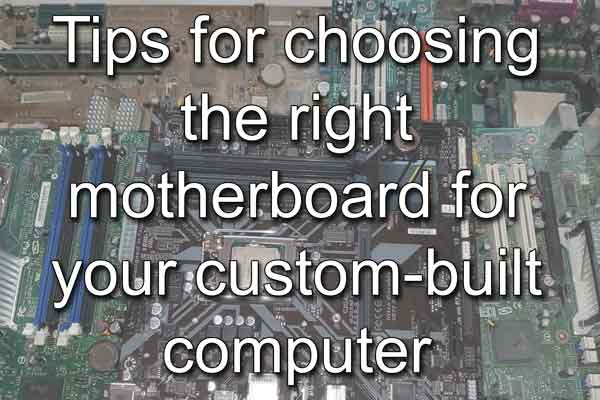Are you planning to build a custom computer? If so, the motherboard is one of the most important components you'll need to consider. It's the backbone of your computer system, connecting all the other components together. In this article, we'll provide tips for selecting the right motherboard for your custom-built computer.

Choosing the right motherboard can mean the difference between a stable, high-performance system and one prone to crashes and other issues. And depending on what you plan to use it for, the features may and will change.
CPU: The first thing to consider when choosing a motherboard is your CPU (Central Processing Unit). Your motherboard must be compatible with the CPU you plan to use. If you plan to use an Intel CPU, you'll need to choose a motherboard with an LGA socket compatible with your CPU. If you plan to use an AMD CPU, you'll need to choose a motherboard with an AM4 socket compatible with your CPU.
There are times when you might need a BIOS (Basic Input/Output System) update to run a newer CPU. Always check the motherboard manufacturer's website for a list of CPUs that are supported and what version of BIOS it may require.
Now, Intel CPU motherboards do not come with brackets to mount a CPU cooler, but AMD CPU motherboards do. If you decide to go with an AMD CPU, remember that some CPU coolers come with their own backplate, and some use the default AM4 backplate that comes with your AMD motherboard.
If your CPU cooler comes with its own backplate, remember to put the AM4 backplate that comes with your motherboard in a safe location, just in case you need to replace your CPU cooler and the new one requires the original AM4 backplate. Finding a replacement backplate can be time-consuming and a little expensive (around $20 w/ shipping). I have had to order plenty of replacement backplates, as the originals got lost.
Chipset: The chipset is another important factor to consider when choosing a motherboard. The chipset determines what features and capabilities your motherboard will offer. The chipset also affects the performance of your system, as it manages the data flow between the CPU, memory, and peripherals.
Size: Motherboards come in different sizes, ranging from mini-ITX to ATX. The size of the motherboard you choose will determine the size of your computer case. Make sure you choose a motherboard that's compatible with the size of your case.
Tips for choosing the perfect case for your computer
Memory: Memory has always been one of the most vital components next to the CPU. Remember that the memory slots have a maximum amount of memory each can use. You multiply that by the number of memory slots, and you get your maximum usable memory.
You always want to have memory modules that have matching specifications, so it is recommended that you purchase your memory modules in twin or quad packs. That way, you will be assured that all of the memory modules will match.
PCIe Expansion Slots: Expansion slots are another important factor to consider when choosing a motherboard. These slots allow you to add additional components to your system, such as graphics card(s), sound card, or WiFi adapter. Make sure the motherboard you choose has enough PCIe expansion slots (x16, x4, x1) for your needs.
How to add an expansion card to your desktop computer
Storage: The type of storage you use with your motherboard will have a direct impact on the performance. Solid State Drives (SSD) are faster, but Hard Disk Drives (HDD) have larger capacity. There are two type of connections for SSDs (M.2 & SATA) but only one (SATA) for HDDs.
The fastest and most common type of drive is an M.2, with SATA drives coming in second. The typical gaming system has an M.2 drive for the operating system and programs files and an HDD for data storage. Once you decide on what drive(s) (M.2 and/or SATA) and quantity you want to use, you can make sure your motherboard has all of the correct (M.2 / SATA) connections.
I/O Ports: The I/O ports on your motherboard determine what devices you can connect to your system. Make sure the motherboard you choose has enough USB ports, audio ports, and other ports you'll need for your peripherals. It's also important to check if the motherboard has a built-in WiFi or Bluetooth adapter.
Also check the on-board headers for the matching connections for your case. You will want to make sure you have headers for the USB (3.2, 3.1, 2.0) ports, case fans, and lighting features your case may have. It sucks if your case has a USB 3.2 port on the front but your motherboard doesn't have a USB 3.2 header to connect it to.
Power: The majority of ATX-type power supplies have all of the necessary connectors (Modular ATX (24-pin), ATX 12V 8-pin (4x4), Molex, etc.) for almost any motherboard. But to be on the safe side, always check the specifications and connectors for any motherboard you are looking at purchasing.
How to estimate the power required for your custom-built computer
Brand and Warranty: Finally, consider the brand and warranty of the motherboard you choose. Choose a reputable brand that offers good customer support and a solid warranty. This will give you peace of mind knowing that you'll be able to get help if you encounter any issues with your motherboard.
In conclusion, choosing the right motherboard is essential for building a stable, high-performance, custom-built computer. When selecting a motherboard, consider your CPU, chipset, size, memory, PCIe expansion slots, storage, I/O ports, power, and brand reputation. With these tips in mind, you can choose the best motherboard for your custom-built computer, ensuring a smooth and enjoyable computing experience.